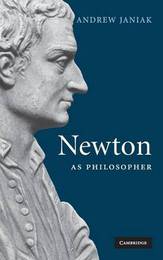
|
Newton as Philosopher
Hardback
Main Details
| Title |
Newton as Philosopher
|
| Authors and Contributors |
By (author) Andrew Janiak
|
| Physical Properties |
| Format:Hardback | | Pages:210 | | Dimensions(mm): Height 235,Width 158 |
|
| Category/Genre | History of Western philosophy
Western philosophy - c 1600 to c 1900
Philosophy of science |
|---|
| ISBN/Barcode |
9780521862868
|
| Classifications | Dewey:192 |
|---|
| Audience | | Professional & Vocational | |
|---|
|
Publishing Details |
| Publisher |
Cambridge University Press
|
| Imprint |
Cambridge University Press
|
| Publication Date |
10 July 2008 |
| Publication Country |
United Kingdom
|
Description
Newton's philosophical views are unique and uniquely difficult to categorise. In the course of a long career from the early 1670s until his death in 1727, he articulated profound responses to Cartesian natural philosophy and to the prevailing mechanical philosophy of his day. Newton as Philosopher presents Newton as an original and sophisticated contributor to natural philosophy, one who engaged with the principal ideas of his most important predecessor, Rene Descartes, and of his most influential critic, G. W. Leibniz. Unlike Descartes and Leibniz, Newton was systematic and philosophical without presenting a philosophical system, but over the course of his life, he developed a novel picture of nature, our place within it, and its relation to the creator. This rich treatment of his philosophical ideas will be of wide interest to historians of philosophy, science, and ideas.
Author Biography
Andrew Janiak is Assistant Professor in the Department of Philosophy, Duke University. He is editor of Newton: Philosophical Writings (2004).
Reviews'Newton as Philosopher is the best and most comprehensive discussion now available of Newton's philosophical views and their relationship with his physics - especially in connection with such vexed issues as the existence of forces, action at a distance, and God's relation to 'absolute space'. It is particularly remarkable for the way in which it very illuminatingly situates these issues within the wider context of early modern philosophy more generally.' Michael Friedman, Stanford University 'Janiak argues strongly for Newton as a philosopher, and gives a bold and compelling account of what he labels 'Newton's physical metaphysics'. Because it details the close relationship between natural philosophy and traditional metaphysical themes, his book will engage not only historians of eighteenth-century ideas but also those philosophers of physics who examine historically foundational physical concepts such as space, time and mass.' Christopher Kenny, University of Leeds
|